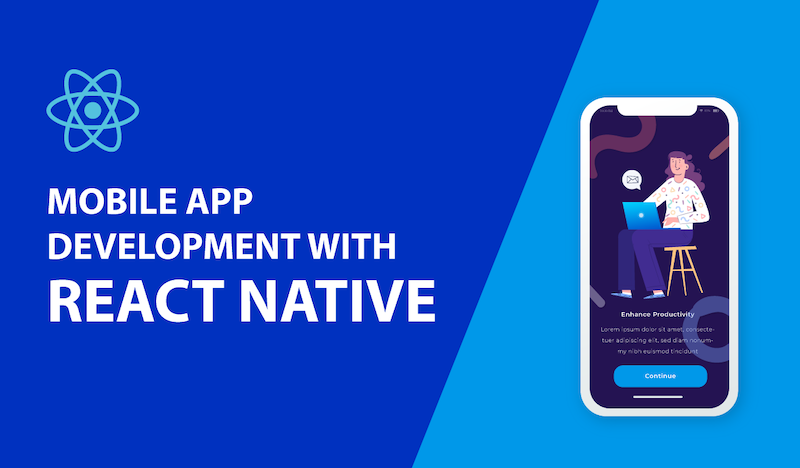Apart from the reusability of the code, many app projects prefer using React Native framework for Android app development, and a bunch of reasons are responsible for this. Let’s now explain the key reasons that make React Native an ideal choice for Android app projects.
Android is the leading mobile operating system running across the vast majority of handheld devices worldwide. Compared to iOS, Android enjoys the widest reach and deepest market penetration among smartphone users across the globe.
In complete sync with this widespread penetration and reach, the Android ecosystem also represents many devices with widely varying capabilities, features, and manufacturer brands. This is why, unlike the iOS, several Android OS versions are simultaneously running across different devices, offering different levels of support for apps across the niches.
Now coming to native Android development, Java has been the official language for years, only to be replaced by Kotlin in recent years. But native Android development has its own limitations, particularly for app projects that, in the future, want to extend to the iOS platform. Instead of building two different app versions for Android and iOS from scratch, many developers, when starting Android app development, postpone iOS development for the future. Reusing the same codebase when extending their footprints on the iOS platform. This is where a robust and modular cross-platform development framework like React Native comes to the rescue. Let’s read the article further to understand what makes React Native perfect for Android App Development.
Extending Your Perfect Android App to iOS
Many app projects prioritize building an app targeting one operating system perfectly and then, based upon its success extending to other platforms in the future. This “one platform at a time” approach is great for ensuring quality focus. But what about extending the app’s footprint to the iOS platform in the future? Well, this is where React Native can play a great role.
React Native allows reusing the same codebase for iOS and Android app versions without compromising on the native user experience. React Native helps developers to connect the native UI layers of both platforms while using the same code. This gives great flexibility for building a perfect Android app and later extending it to the iOS platform.
Modular and Incremental Development
React Native has a component-based modular architecture that further makes the framework flexible for app projects of all types and niches. Let’s assume you must execute a great app idea based on market feedback. In such a case, you should first focus on unleashing a basic app with the core features or elementary value proposition. After the release, based on user feedback and market appreciation after the release, you can plan to add more features, make some changes, or add value to it. We call incremental development represented by popular approaches such as Minimum Viable Product or MVP.
React Native is an ideal framework to build an app incrementally over time, starting with an MVP version. You can just use ready-to-use UI components from React Native libraries for adding features through app updates. This allows Android projects to reduce the initial cost of development and utilize resources in a relevant manner based on market traction.
Faster Development & Testing Cycle with Hot Reload
The android ecosystem is vast and populated by many devices from OEM manufacturers of all sizes and market reach. This often makes it challenging for Android developers to test their products and release them quickly. The slow pace of development and release cycle ultimately can reduce your competitiveness in the market when so many similar apps populate every app niche or type.
React Native, in this respect, can prove to be a great rescuer thanks to its Hot Reload feature. This feature allows developers to see the results of their code and code changes in real-time through the live app. Android developers, when testing the code and changes for different device-specific experiences, do not need to reload the app repeatedly. The coding and code changes go on simultaneously with evaluating their impact on the app user experience.
Apart from ensuring faster development and testing cycle, this Hot Reload feature also puts developers at ease with app maintenance and updates. Reviewing the effect of any additions and alterations in real time helps developers release updates quicker.
JSON or HTML Flavored JavaScript Code
React Native is a framework based upon the ReactJS library, which is widely known for using HTML-like format for JavaScript code and JSON format. React Native offers the same ease of updating and improving data because of this developer-friendly JSON format.
JSON data format also helps developers to lower the learning curve and compile and deploy code faster. The JSON data format used by React Native makes server-side configuration and API handling much easier.
Engaging User Interface
React Native has a robust repository of UI components for Android and iOS. Particularly for a diverse Android ecosystem. React Native helps deliver aesthetically appealing and experience-wise endless UI options based upon the app type and niche.
React Native boasts of a library full of declarative UI components for every specific user interface element ranging from font and typeface choice to colors to several others. Creating a rich Android UI by using React Native is much easier.
Robust Plugin & Community Support
Finally, when it comes to supporting Android developers, React Native has a fair edge over other cross-platform technologies simply because of its large worldwide developer community. Secondly, React Native has the official support of many third-party plugins for extending the app features.
Across all major developer platforms, including StackOverFlow and GitHub, React Native enjoys the community support of thousands of competent developers. Whenever developers in an Android project get struck, community support is readily available to troubleshoot and find a solution.
Wrapping Up
Let’s not forget React Native has been reigning in the android app development projects for years, and it has always been among the most loved frameworks for both native and cross-platform app development. Particularly for a diverse and multifaceted platform like Android, React Native framework proves to be the most effective.










Leave a Reply